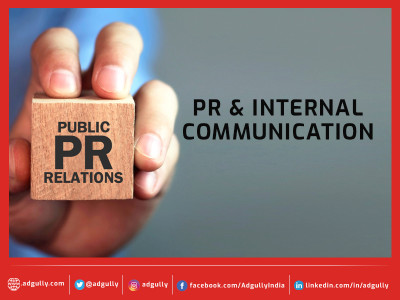Making internal communication the key medium for PR – a refreshed look
Internal communication is all about promoting effective communication among people within an organisation. It involves producing and delivering messages and campaigns on behalf of management, as well as facilitating a dialogue with the people who make up the organisation. The information that is shared could be anything from new policies or an upcoming event. While internal communication can fall under HR, today the corporate communication department is taking more active interest to draw up a well thought out internal communication program for organisations. According to a study conducted by IBM, 72% of employees don’t understand their organisation’s strategy, which is a result of poor communication. Thus, it is important to ensure that your employees understand the company strategy through clear internal communication.
In the early days, somewhere in the 60’s and later on, the role of Internal communication was seen as a powerful tool to engage with the employees. A simple newsletter was published every month or once in two months, which carried all the news and information about the company both in terms of policies and recreation that happened in the organisation. MNCs like Philips and Pfizer had newsletters named as ‘Parichay’ and ‘Pigeon Post’, which the employees looked forward to. The purpose of the newsletter was to foster togetherness as an organisation and send a positive vibe to all the employees through the newsletter which was nicely designed with colourful pictures and some interesting content from the employees also.
Today one is surprised and astonished as many companies and organisation undervalue or neglect internal communication. With the digital age today,many organisationsare using the intranet as the way to stay communicated internally with the employees. But what is more important is the content and the message that is delivered through this internal communication. A well-structured internal communication program will always boost the employee morale and will also send a positive image to the outside world through the employees. Smart organisation with strong corporate principles for whom the employees come first understand the value in maintaining an ongoing dialogue with their employees with the right strategies and thinking. And this will only help in getting valuable feedback from the employees that will help in fostering a sense of belonging with the organisation.
Employees are huge assets of the company as they represent the organisation and interact with customers and general public. So, it is very important to stay engaged with your employees as their insights and feedback from the outside world will be valuable to the leadership team. A well-crafted communications plan will support your organization in all internal initiatives and teaches you to maintain continuous employee communications. An effective internal communication will only further strengthen your engagement with your employees and will help you collaborate better which will help in boosting their productivity and performance.
Today in an VUCA world it is important for organisation to have a robust internal communication strategy in place. A sound internal communication strategy will help in building a great relationship with your employees and maintain a steady flow of communication with them. Even employees are keen to know from the management about the progress of the organisation as that will also build their confidence with the organisation. Reaching every employee will only help the organisation to strongly convey the vision and mission of the organisation which will then also help the employees to align accordingly and be part of the growth journey of the company.
Presenting her views Shobha Vasudevan, Head - Enterprise Communication & PR – Dell Technologies said,I believe that at the core of any organization, are its people. Therefore, internal communication is extremely important to relay brand ethos within the organization. It is also one of the key mediums to establish dialogue with the workforce and create a sense of belonging internally. Through strong internal communication campaigns, my intent has always been to ensure that the employees become trusted and proud brand advocates. However, one of the biggest challenges is to employ creative mediums to attract and retain the attention of employees. One has to come up with innovative ideas to remain relevant and add value.
She further pointed out that for instance, at Dell Technologies, we currently run and host FineTuneIn, an innovative in-house podcast series. The series, which started as an initiative to keep employees, stakeholders and spokespeople engaged and motivated through tougher times in the middle of the Covid-19 pandemic has now become an inspirational activity that executives at Dell Technologies look forward to. With over 18 successful episodes, FineTuneIn has become a favourite at Dell Technologies India, opening doors to speakers even outside of the organization to ensure that the employees are never out of inspiration.
Communications at all levels is extremely important for a brand to be seen and heard in the way it wants to be positioned. According to C. Lekha, AVP - Corporate Communications & Brand Reputation, Indigo, internal communication is a powerful tool and indeed responsible for effective communication within the organization. All stakeholders hold equal importance be it current or potential customers, employees, or any other associate.
Therefore, it is important for us to have a clear and transparent communication at all levels. Every organization today is striving to stay connected, especially post-covid, by continuously sending out newsletters/ updates and opening channels of communications with the internal audience. At the end of the day, they are the true brand ambassadors.
Continuing further she said that as a priority, organisations should ensure that their communication is consistent and accurately represents the company’s goals, core values and latest initiatives of the company. We should ensure the internal percolation of the brand positioning from an HR perspective hence creating cohesive alignment for employees.
Other than that, organisations should also be open to feedback, so that the employees share their perspective and engage, which allows them to establish and sustain a rapport across all stakeholders. At IndiGo, we always encourage employees for two-way communication in every possible situation."
In a post #COVID era, the importance of internal Communication & engagement has increased multi fold. Sharing his perspective Bhaskar Majumdar, Head - Corporate Affairs, Communication, CSR and Digital, Egis India said we need to be flexible, patient, and understanding with all stakeholders, especially employees. Communication should be transparent, empathetic, proactive, and consistent. Hence, meaningful, consistent engagement with internal audience is key for all brands. The adaptation of digital communication has made it easier to connect with all stakeholders especially in a #hybrid or #WFH work environment.
He further added that while today’s communication professionals are more tech-savvy and trends-focused, the profession still concentrates on shaping the right messaging, creating the strategic narrative and identifying the target audience. Employee engagement is the key to both – sustaining corporate reputation as well as building and maintaining equity and salience of your brand. There is no iota of doubt about the fact that your employees are one of the primary stakeholders of your company. They are truly what enable a brand to do what it does. Going forward, a truly well-entrenched people-first culture, work-life balance and harmony, humane and compassionate HR best-practices, diversity and inclusion at the workplace, women safety and empowerment, opportunities for career growth, workplace wellness, millennials and Gen Z friendly employee benefits, will be some of the key priority areas
Ajey Maharaj, Head - Corporate Communications & PR, Fortis Healthcare Limited was of the view that the success of any organisation depends on the willingness of its employees to give their best to achieve the organisational goals and objectives. In this context, Internal Communications has long been regarded as a crucial tool to keep employees connected, energised and engaged. The pivotal role of Internal Communications has been especially acknowledged in large, geographically distributed multi-location organisations. The COVID-19 pandemic has served to further accentuate the importance of this vital function.
Internal Communications is tasked with enabling the flow of relevant and timely information across the organisation. It ensures that everyone is aligned to the organisational goals and priorities. Internal Communications also serves as an important tool to build a culture of excellence, improve collaboration, recognise achievements, celebrate successes and instil a sense of pride and belonging in every employee.
He added that most importantly, Internal Communications plays a major role in building an endearing employer brand image and enhancing the organisation’s perception as a transparent, equitable and ethical employer that is making a positive difference to the lives of its consumers, whilst giving a voice to the employees to share their ideas, thoughts and suggestions, and become stakeholders in the organisation’s progress.
With changing times, Internal Communications, too, has undergone a significant change. Most of today's workers are tech-savvy, often deskless knowledge workers. They consume information in a very different way compared to their predecessors. Consequently, one of the key challenges is to adapt to the changing communication technology landscape and present information in innovative and engaging ways. Of course, while this scenario appears as a challenge, it also presents many exciting opportunities for Internal Communications professionals.
Internal communications hasbecome a key tool for organizations in the pandemic/ post-pandemic era. Giving her views Ms. Akanksha Jain, Head- Public Relations and Corporate Communications, BharatPe said that it is the key channel for organizations to ensure alignment to larger goals and for leaders to communicate and motivate their team members, especially in today’s times of remote working. A well-thought through, comprehensive internal communications strategy can go a long way in building an organization as a ‘great place to work’.
She further noted that some of the key challenges with internal communications is to build content that is engaging and impactful. Also, companies need to invest their energies in picking the right channels that resonate with their workforce- ranging from emails, blogs, mobile apps, intranet, collaboration tools to comprehensive sessions.
An important way to ensure effective employee communication across the board is to ensure that the company encourages regular employee feedback. Companies should run anonymous surveys/ conduct one-on-one meetings with employees to better understand the employee sentiment and address grievances and challenges. Open feedback leads to effective communication, which is a foundation for building a customer-centric environment.
In the age of social media, every employee is a brand advocate and hence, companies, irrespective of whether they are a young brand or a traditional one, should focus a lot more on nurturing their team members, invest in building a great work culture.










Share
Facebook
YouTube
Tweet
Twitter
LinkedIn